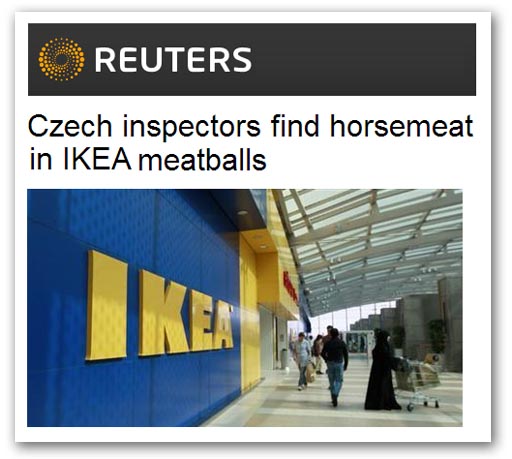The Czech State Veterinary Administration reported its findings to the EU's Rapid Alert System for Food and Feed (RASFF), after its inspectors took samples for DNA tests in IKEA's unit in the city of Brno from a product labelled as "beef and pork meatballs" (87%).
IKEA, according to other press reports, has said that the meatballs were made by the Familjen Dafgård group, located in central Sweden, a firm which claims to put a "lot of love and care" into its products (as well as horsemeat).
However, the family Dafgård is not alone. The Czech inspectors also found horsemeat in burgers from Poland labelled as "beef pre-fried burger" supplied to the food trader and distributor BidVest in the Czech Republic.
The IKEA suppliers have not yet disclosed the source of their meats, but in the "beef pre-fried burger", we have another finger pointing at Poland. This link is being pointed up by Die Welt and others, although information on origin is no proof of complicity in fraud. This we saw with the Romanian link.
Nevertheless, as the days pass, we are getting the full flavour of the European dimension of this fraud. So far, we have information of adulteration events in Ireland (several), the UK (two), Germany (two or three), Luxembourg (one), France (one or possibly two), Italy (possibly one) and now Denmark and possibly Sweden, with persistent but unproven claims of Polish involvement.
The little Englanders of the media are still keen to plant their Union Jacks on the issue, making mischief on the FSA and other local matters, but the facts demonstrate that this is a pan-European failure, with the EU's regulatory system at the heart of it.
Not only does the media seem to be having difficulty with this, they are also still using the phrase "food chain", when "network" would be much more appropriate.
Thus we have a Swedish furniture shop in the Czech Republic selling meatballs which were also on sale in Netherlands, Belgium, Portugal. They were made by a completely different firm in Sweden, although they were claimed to be "IKEA food", and were made from ingredients supplied by other companies (as yet undisclosed, but which could be anywhere), all to a common regulatory standard decided in and enforced from Brussels.
What is fascinating to see, though, is that FAK notes that IKEA's food sales worldwide amounted last year to €1.3 billion, making it a major food retailer in its own right.
Yet, despite the value, and the prestige of the brand name, this firm – along with many others – have put their trust in the Brussels regulatory system and ended up selling adulterated foods. UKIP should be having a field day.
COMMENT: "HORSEMEAT" THREAD
